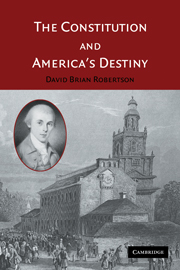Book contents
- Frontmatter
- Contents
- List of Tables and Figures
- Preface
- Acknowledgments
- List of Abbreviations
- 1 Politics and the Constitution
- 2 The Policy Crisis of the 1780s
- 3 James Madison's Plan for the Constitutional Convention
- 4 The Political Landscape of the Constitutional Convention
- 5 Who Governs? Constituting Policy Agency
- 6 What Can Be Governed? Constituting Policy Authority
- 7 How Is the Nation Governed? Constituting the Policy Process
- 8 Our Inheritance: The Constitution and American Politics
- Index
6 - What Can Be Governed? Constituting Policy Authority
Constituting Policy Authority
Published online by Cambridge University Press: 11 November 2009
- Frontmatter
- Contents
- List of Tables and Figures
- Preface
- Acknowledgments
- List of Abbreviations
- 1 Politics and the Constitution
- 2 The Policy Crisis of the 1780s
- 3 James Madison's Plan for the Constitutional Convention
- 4 The Political Landscape of the Constitutional Convention
- 5 Who Governs? Constituting Policy Agency
- 6 What Can Be Governed? Constituting Policy Authority
- 7 How Is the Nation Governed? Constituting the Policy Process
- 8 Our Inheritance: The Constitution and American Politics
- Index
Summary
The compromises on policy agency wrecked the foundation of Madison's plan for far-reaching national powers. As the selection of policy makers grew more complicated, the delegates grew more wary of national authority. Madison's opponents had battled to limit the government's reach and to protect the states' authority to manage their internal affairs. This inclination grew as the drive for proportional representation faltered. Key delegates, concerned about slavery, trade, and other vital interests, came around to Connecticut's argument that the national and state governments should share sovereignty.
The Constitutional Convention began to mark out this dual sovereignty with a crucial political deal that enabled the national government to supervise trade with other nations while allowing the states to manage slavery. The delegates reinforced shared sovereignty further by allowing the states substantial authority to manage property, commerce, economic development, the military, individual behavior, and rights. They could not avoid giving the national government the power to levy taxes, but they designed taxing authority to make it hard to use national taxes to help or harm particular constituencies. Other provisions gave the national government tools that could facilitate market-driven economic development without threatening individual states. The Constitution, though, left undefined many boundary issues between state and national authority. It delegated disputes about these boundary issues, along with contentious problems such as public lands, debts, and the location of the capital, to the politics of the new national policy-making process.
- Type
- Chapter
- Information
- The Constitution and America's Destiny , pp. 165 - 201Publisher: Cambridge University PressPrint publication year: 2005



